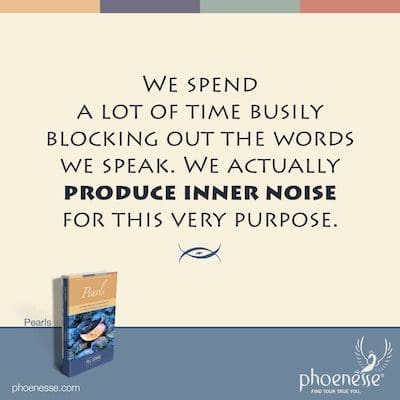This work of spiritual transformation is a magnificent process. Through it we are literally reintegrating split off parts of ourselves which, when left on their own, create and recreate painful patterns. Over time, these aspects generate momentum resulting in negative patterns that carry the day; we get caught in them and can’t reverse them. We seem to be their victim and no longer connect with how we created this movement we’re carried in.

But it is possible to unwind all this, to reverse the momentum and rise up from the charred remains of our faulty creations. Let’s look at precisely how such a process can be consciously initiated to transition from negative creations to positive self-perpetuating motion, all by using our voluntary will and the power of the word.
Exactly what is the word? It is the creative agent that launches movement and a systematic chain reaction, with one link inexorably following another. By the end of the line, the word becomes a deed, a fact—a finished creation.
Words are the blueprint necessary for building any structure. The word, in fact, is what’s behind all creation; nothing in creation can exist unless a word has been spoken, known, held, believed in and committed to. The word both expresses and creates by forming patterns of energy that then form additional nucleuses where each point or link—which are also words—becomes a secondary creative agent. The word is plan and opinion, knowledge and consciousness, feeling and attitude and intention. Words carry their own kind of powerful energy that is not like other energies. Words are all this and more.
The spoken word reveals the will—either divine will or the split off ignorant will—that is the motivating force behind what is being uttered. In any area where we speak, our words are the sum total of our beliefs, be they conscious or not. Like the sun that creates the planets, the word is the energizing force and it is the design. So incredibly much is contained within the word.
Holy Scripture starts by postulating that in the beginning was—or actually is—the word. The word is eternal; it will always be. It is from God’s spoken word that all creation came into being, including our personalities. It’s behind the creation of everything from our unique feelings and experiences to planetary systems and the greater consciousness of all people.
So what do we do with this truth? How can we put it to good use in our daily lives? Well, for one thing, we can become aware that every situation we experience in life is the product of words we ourselves have spoken. Day in and day out, in every hour and every minute, we are constantly speaking words on various levels of our being. The goal of this spiritual path is to make all these words conscious, because that is the only way for us to understand our creations.
Unfortunately, we spend a lot of time busily blocking out the words we speak. We actually produce inner noise for this very purpose. Just what is it we’re saying that we don’t wish to hear?
Words can be in disagreement within themselves. This happens when we speak opposite words on different levels of our awareness so that they effectively cancel each other out. This confuses us and we create accordingly. We also create fog so that we can’t see what we’re saying, allowing some words to overshadow others. We need to get clear about which words are doing the creating, especially of the stuff we don’t like. These are sharp tools we’re handling; it’s time to see the power they wield to produce disasters or delightful successes.
When we speak words of beauty and truth, but underneath lies incompatible material, we create at best a short circuit and at worst a split in our consciousness. This is why it’s preferable in the beginning to honestly admit the negativity of our Lower Self. This is an act of truthfulness, humility, courage and faith, and there’s nothing wrong with these Higher Self qualities.
If, on the other hand, we speak words that reveal divine principles but do so while the Lower Self is still hidden, we’re standing in a line-up of wishful thinking, pride, lack of faith and a fear of letting others see our imperfections. We’re shirking the process of growing and healing in a realistic way. Words about limitless abundance, then, can be spoken without being in truth.
There is a direct link between the words we choose and our self-value. Think about it: is it possible to talk about faith and the unfoldment of our beings from one side of our mouths, while we’re silently whispering that we have no value from the other? Deep in our hearts, we all carry some shards of feeling worthless; how can we challenge this if we secretly are terrified that worthlessness is the truth of who we are? All we can do is to block this “knowledge” and defend ourselves against it.
In truth, it’s these defensive maneuvers that reinforce this notion that we’re unacceptable. This is so because our defenses are purely destructive guilt-generators. So even if we become belligerent and tell ourselves we do deserve peace of mind, pleasure and abundance, deep down we feel we don’t really deserve this and so fear we’ll never have it.
Worse, we fear that if we did manage any kind of fulfillment, we’d need to steal it and would therefore be punished. So on the surface we may speak words about what we long for—which is the same as what every human longs for and indeed should experience—while simultaneously cutting ourselves off at the knees on another level. This state of division and self-denial makes us pessimistic about life and fearful of the world. Our vision is fragmented and so is our experience.
Our goal: establish a one-pointed word. It will take honesty and courage to expose ourselves and our devastating belief in our lack of value. We must pierce through our facades and cover-up stories to see our painful feelings about being unlovable, and then cast our doubt on our self-doubt. This is the avenue that leads to pronouncements of real truth.
We can pry open the lid of our self-doubt with questions about the truth. “Is it true that I need to defend myself to feel my value?” “Under my arrogance, am I floundering in doubt about my value?” Then we can ask ourselves: “Is it true my faults make me undeserving and unlovable?” “Is there something in me that justifies loving myself?” Such questions can carry words of truth.
Words are no less powerful when they are not articulated well. Vague and hazy words need to be crystallized and brought out from behind the smoke screen. Start to see the energy that thoughts hold and the power they have to create. This is not the same energy as is expressed on other levels, since the mental, physical, emotional and will levels each express in different ways. Just don’t underestimate the power and energy of the word.
We may think our thoughts and comments—either said loudly or silently—do not matter. So not true. The silent word is not necessarily less powerful than a word that is uttered. In fact, words that wash across our vocal chords may well have much less energy than the ones held inside that are rooted in strong beliefs. We use these lightly spoken words, said without feeling or conviction, to fill the void inside us with fog. This separates our consciousness from the words we speak that do have power—for good or for bad—and therefore this pitter-patter of thoughts has a serious effect.
We are the ones who wittingly or unwittingly set the creative process in motion—through all our words. By tuning into the underground noise, and observing and identifying our words, we will gain a much better understanding of how we create our lives.
Sometimes our words contradict divine truth, sending our energies into involuntary patterns that make life seem dangerous and foreign. It feels like we must defend ourselves against life, like we’re a helpless pawn. So we can pick another word that aligns with the truth of creation and start creating benign circles of love and bliss, joy and abundance.
No joy? No abundance? We must be speaking a word that denies this possibility. Maybe we secretly believe we don’t deserve it. Maybe we don’t think it even exists. Perhaps we feel too bad or evil to deserve fulfillment. All this might be hidden from our conscious mind, which generally just feels pessimistic and adrift. Then feelings of helplessness may seem overwhelming. Know this: there is a chain of cause and effect linking our words and our experience. It can be found and unkinked.
Holding onto a nihilistic belief about a terrible world may seem preferable to seeing our own painful belief that we’re not worthy of the joy of life. But folks, if we believe this, we’re not in truth. We need to find the words behind such thoughts. Find the ones that say ‘it’s dangerous to love, it will hurt me.’ These are untruths that create nothing but painful patterns that make them seem true. But no, still not truth. These words—not real reality—are what keep us from experiencing the fulfillment we long for.
Some words are spoken so deep in our unconscious we’re not at all aware of them. It’s like they’re spoken at the bottom of the ocean while we’re splashing around on the surface. But with one ear under the water, we can start to tune into them. This is the kind of effort we must make to dredge them up, following whatever hints and clues we notice. Sitting quietly in meditation is a good opportunity to listen.
We’re referring here to “words” rather than “thoughts” because the word is what immediately creates; it’s the energy explosion. The thought is the content—the result of underlying factors—that goes on to express itself through the word. That said, the word occurs at the inception of the thought, so it’s not possible to have a thought without the word. It simply could not exist. But again, the word may or may not occur at the level of our conscious awareness or be vocalized.
The main take-away here is this: we need to take care with our words, making space for them to become clear and taking responsibility for the words we say quietly within. We can question their origin: do they arise from a truthful thought or an untruthful one? We can reject, revise and debate our thoughts before the power of the word clinches them, forming the finished product of the thought and beginning to create.
Differentiating between words and thoughts may seem like we’re splitting hairs, but it’s not. If, for example, we feel unworthy of the best life has to offer, we can question this thought. But if we speak these words within ourselves, it’s a creation that we now take for granted. It doesn’t occur to us to challenge it, debate it and therefore correct it. That’s how, unaware to us, we’re giving such a thought power.
The boat of our lives rocks back and forth over this kind of undercurrent, which carries us to unfortunate destinations. Not only do we no longer notice the current, we no longer see how we created it and can change it. Anywhere we notice that our creations are limited and undesirable, we must look for the associated words that are responsible and begin to say different ones.
If we do this by way of a superficial mantra, pasting ‘yes, I am worthy’ over opposing words buried below, we’ll create a short circuit. Then we’re paying lip service in our thoughts and minds without unearthing the opposite word. We will know this is happening by looking at what’s manifesting. Make no mistake, that’s the pudding that always proves what’s really being spoken within.
Until we unwind all this for ourselves, we may be convinced that the positive words spoken on the surface are all that count. We might then use the fact of our opposite experiences as proof that life is unfair and untrustworthy—that our own inner processes have no bearing on what goes on. People, we then think, are victims of life.
Once we go a little further in our work though, we will uncover our unfortunate self-hate and our lack of faith in our own Higher Self. Knowing this information about the power of the word will help in our search for the imposters, those parts of ourselves who still speak on our behalf but don’t represent our best interest.
There are two words—giving and receiving—that deep inside ourselves sound like opposites, and this misnomer creates a big conflict. Mentally, superficially, we may have gotten the message that giving and receiving are one and the same thing. But many of us haven’t experienced this truth yet. So emotionally, there may be quite the chasm between them.
Here’s how this goes. When we knock our own value through the words we say to ourselves, we become afraid. Our fear makes us avoid moving out into the world so our heart won’t flow into another’s. We think the ticket out of this miserable state is to be loved. So then along comes love, but no matter how much we long for it, we can’t let it in; we find excuses to not accept it. Our mind may be divided but the truth that giving and receiving are one is still evident: as we don’t give, so we can’t receive.
To take in love, we must feel we are worthy of it. But if we feel worthless, then being loved threatens to expose this pain. Giving love also suffers, because we can only give love when we feel we deserve the pleasure of doing so. So to receive love, we must feel we deserve it, and that can’t happen if we don’t wish to love. Anyone else feeling dizzy?
It’s a false idea that if we were loved, we could then love. This simply doesn’t work. These are false words we speak into ourselves on some level. No one else can give us the love and sense of worth we need to give to ourselves. Often, in fact, we are given to, but we reject what comes in the form of sincere love—from others, from God and from life itself.
Due to our wrong thinking, we experience an impossible division—we can’t receive because we don’t give—instead of the oneness of giving and receiving. For in the simple act of taking in love, we are giving; not being willing to take in what is given is a form of ungivingness. So taking is already giving, as long as we’re not grabbing or cheating. We can experience this in the way it hurts when something we have to give another is not wanted. But when they receive from us, they give us something.
All this can become an endless flow, even though we may sometimes find ourselves more in one stage, perhaps giving only through our sincere receiving. That’s all right. If we receive in truth and beauty, we’ll become stronger in other kinds of giving, including giving from our resources. We just need to articulate the appropriate words to ourselves. These are the ones that support our growing power to give and receive, each in truth, wisdom, beauty and alignment with God’s will.
It takes courage to speak words of truth such as ‘I can give my best and let God give through me—in truth, wisdom, beauty, strength and sincerity.’ For one thing, we’ll need to give up our misguided safety nets, including our shaky conclusions about the negative nature of life. And darn it, we’ve invested so much into this. But unless such falsehoods are relinquished, true words can’t be said.
We’ll need to have faith in a kind and caring universe, and such faith, in turn, requires a commitment. We must extend ourselves into unexplored alternatives, believing in a possibility we haven’t yet experienced for ourselves. Having the courage to pronounce words of truth is the prerequisite to knowing a new truth. And faith, in the end, is always made up of courage and strength. Truer words were never said.
Return to Pearls Contents



